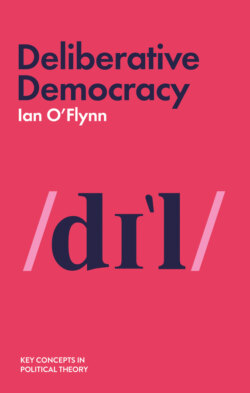Deliberative Democracy

Реклама. ООО «ЛитРес», ИНН: 7719571260.
Оглавление
Ian O'Flynn. Deliberative Democracy
Table of Contents
List of Illustrations
Guide
Pages
Series Title. Key Concepts in Political Theory series
Deliberative Democracy
Copyright Page
Preface and Acknowledgements
Dedication
1 Deliberative Democracy
Two basic criticisms
Normative theory and empirical research
Origins and revival
What is deliberative democracy?
2 Deliberative Differences
Freedom and equality
Reason-giving
Consensus
The common good
3 Deliberative Mini-Publics
Why mini-publics?
Design issues
Inclusion
Participation
Information
Decision-making
Agenda
And what else?
4 Deliberative Systems
Habermas’s two-track model
Systemic rights and wrongs
Warren’s problem-based approach
5 Pluralism and Deliberative Democracy
Pluralisms
Public reason and its critics
Democracy in divided societies
6 Global Deliberative Democracy?
Political cosmopolitanism
Rawls’s law of peoples
Habermas’s postnational constellation
Dryzek’s contest of discourses
Some brief concluding thoughts
References
Index
POLITY END USER LICENSE AGREEMENT
Отрывок из книги
Ian O’Flynn
In the first instance, this book is about the concept of deliberative democracy and the many different ways in which the concept has been understood. It is, more specifically, about deliberative democracy as a normative project – a project concerned with evaluating existing democratic institutions and practices and proposals for their reform. It almost goes without saying that normative claims imply empirical questions, some of which are discussed in this book. However, the book is principally located in the broader field of political theory (or, if one prefers, political philosophy).
.....
In Chapter 2, we will look at these and other related issues in more detail. Before we do so, there are two further introductory tasks to be completed. First, in terms of setting the scene for the rest of the book, it is important to get some sense of the intellectual origins of the ‘deliberative revival’ that began in the 1980s. Second, in order to pave the way for a closer examination of how the concept of deliberative democracy has changed since that time, it is important to see how it was originally defined. To this end, we will turn in just a moment to the extended definition presented by Joshua Cohen in his seminal essay, ‘Deliberation and Democratic Legitimacy’ (1989). But let us begin with origins and revival.
There are many reasons to trace the origins of contemporary ideas about deliberative democracy. Of those reasons, one of the more interesting is that it shows us how deliberation, political equality and accountability came to be so central to democratic theory.
.....